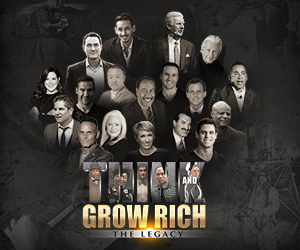Introduction
In an era where the latest trends and technologies seem to dictate the path to success, it’s both refreshing and remarkable that a book published in 1937 continues to hold immense value. “Think and Grow Rich” by Napoleon Hill isn’t just a book; it’s a manual for success that transcends time.
Why, in the bustling and ever-evolving year of 2024, does this book remain a beacon for those on their personal development journey? This article delves into the heart of Hill’s teachings, drawing parallels with modern strategies and showcasing why this classic is more than just a remnant of the past—it’s a roadmap for the future.
In the pages of “Think and Grow Rich,” Hill distilled the wisdom he gleaned from studying over 500 successful individuals. What he found wasn’t just strategies or tips but a philosophy of success that has proven to be as applicable today as it was nearly a century ago.
But how does a book written in the early 20th century retain its relevance in a world driven by digital innovation and rapid societal shifts? The answer lies in the universality of its principles and the adaptability of its teachings to the challenges and opportunities of the modern world.
Let’s embark on a journey through the core principles of “Think and Grow Rich” and discover how they align with contemporary personal development strategies, offering timeless wisdom to navigate our fast-paced, technology-driven lives.

Core Principles of “Think and Grow Rich” and Their Modern Equivalents
The genius of “Think and Grow Rich” lies in its foundational principles, which Napoleon Hill distilled from his extensive study of successful individuals. These principles aren’t mere steps but a mindset that has seamlessly transitioned into the fabric of modern personal development.
- Desire: The Starting Point of All Achievement
In 1937, Hill emphasized desire as the starting point of all success. Fast forward to 2024, and this principle aligns perfectly with the modern understanding of goal-setting and ambition. Today, we talk about vision boards and SMART goals, but at their core, they’re just structured manifestations of desire. - Faith: Belief in the Attainment of Desire
The power of belief, a cornerstone of Hill’s philosophy, resonates with contemporary concepts like the growth mindset. It’s the idea that belief in one’s capabilities is a self-fulfilling prophecy in personal and professional growth. - Autosuggestion: Influencing the Subconscious Mind
Hill’s concept of autosuggestion mirrors today’s practices of affirmations and positive self-talk, pivotal in rewiring our thoughts for success and combating the negative biases of the mind. - Specialized Knowledge: Leveraging Expertise for Success
In our era of information overload, Hill’s emphasis on specialized knowledge is more relevant than ever. It’s about honing skills in specific areas, mirroring the modern pursuit of expertise and continuous learning in a rapidly evolving world. - Imagination: The Workshop of the Mind
Hill recognized imagination as a powerful tool for innovation. In 2024, this translates into creative problem-solving and out-of-the-box thinking, skills highly valued in every field from technology to art.
The relevance of these principles today is a testament to their timelessness. They are not relics of the past but tools for the future, shaping the way we approach success and personal development in a world that is constantly changing.

Application in Today’s World
The enduring wisdom of “Think and Grow Rich” isn’t just theoretical; it’s immensely practical, even in our modern, fast-paced environment. The application of Hill’s principles in today’s context shows how timeless concepts can be adapted to contemporary challenges and opportunities.
- Adapting to the Digital Age
Hill’s principles, when applied to the digital world, can lead to remarkable successes in online entrepreneurship, digital marketing, and social media influence. For instance, the principle of specialized knowledge becomes crucial in niches like digital marketing, AI technology, or e-commerce. - Persistence in the Face of Modern Challenges
Today’s world is characterized by rapid changes and uncertainties. Hill’s principle of persistence teaches us to stay resilient, adapt to changes, and persist in our endeavours – a vital lesson for thriving in today’s dynamic environment. - The Master Mind in the Era of Networking
The concept of the Master Mind group is more relevant than ever with the advent of global connectivity. Networking, whether online or offline, allows for the creation of powerful alliances, fostering the collaborative success that Hill envisioned. - Harnessing the Power of the Subconscious Mind
In an age where mental health is given precedence, Hill’s focus on the subconscious mind is particularly poignant. Techniques such as mindfulness, meditation, and positive affirmations are modern tools that align with Hill’s teachings. - Using Technology to Implement Hill’s Strategies
Today’s tools and resources offer new ways to apply Hill’s principles. Apps for goal-setting, online communities for Master Mind groups, and digital platforms for specialized learning are just some ways to integrate these timeless principles into our daily lives.
In essence, “Think and Grow Rich” offers a philosophical blueprint that is as relevant in the digital age as it was in the early 20th century. Its principles are not just about achieving wealth but about cultivating a mindset and approach that can lead to success in any era.

Alignment with Current Psychological Research
“Think and Grow Rich” remarkably echoes many findings of modern psychological research on success and achievement. Let’s delve into how Hill’s principles align with today’s scientific understanding of what drives success.
- The Power of Positive Thinking
Hill’s emphasis on positive thinking and self-belief is supported by contemporary studies showing the impact of a positive mindset on success. Research in positive psychology demonstrates that optimism and positive affirmations can significantly affect one’s ability to achieve goals. - The Role of the Subconscious Mind
The book’s focus on the subconscious mind finds resonance in modern research about how our subconscious beliefs and attitudes shape our behaviours and decisions. This is seen in studies on cognitive behavioural therapy, which address underlying thought patterns to drive change. - The Importance of Persistence and Resilience
Hill’s principle of persistence aligns with psychological research highlighting grit and resilience as key predictors of long-term success. The ability to persevere in the face of challenges is a trait commonly found in successful individuals across various fields. - Master Mind Groups and Social Psychology
The concept of Master Mind groups is supported by findings in social psychology, emphasizing the importance of social influence and collaboration in achieving success. Peer groups can significantly impact motivation, accountability, and the sharing of knowledge and resources. - Visualization and Goal Setting
Hill’s advice on visualization and setting clear goals is echoed in psychological research on goal-setting theory, which stresses the importance of specific and challenging goals in driving performance.
In essence, the principles of “Think and Grow Rich” are not only philosophically sound but also scientifically valid, lending them a timeless quality that continues to guide individuals towards success and fulfilment.

Practical Steps for the Modern Reader
“Think and Grow Rich” is more than just a collection of ideas; it’s a guidebook for action. Here are practical steps inspired by Hill’s teachings, adapted for the contemporary reader:
- Define Clear, Specific Desires
Just as Hill emphasized the importance of desire, set clear and specific goals for what you want to achieve. Use modern tools like goal-setting apps or vision boards to keep your objectives in focus. - Cultivate a Positive Mindset
Practice positive affirmations daily. Utilize apps or journals to reinforce a positive mindset, echoing Hill’s principle of autosuggestion. - Seek Specialized Knowledge
In a world brimming with information, prioritize learning in your area of interest. Online courses, webinars, and e-books are great resources for gaining specialized knowledge. - Embrace the Power of Imagination
Set aside time for creative thinking. Use techniques like mind mapping or brainstorming sessions to unlock your imaginative potential. - Develop a Detailed Plan of Action
Translate your desires into a concrete plan. Break down your goals into actionable steps and set deadlines for each milestone. - Form or Join a Master Mind Group
Connect with like-minded individuals. Online platforms and social media groups can be great places to find or form your Master Mind group. - Practice Persistence
Embrace the principle of persistence by setting up a system to track your progress and stay motivated, even when faced with setbacks. - Utilize Technology
Leverage technology to aid your journey. From productivity apps to digital reminders, technology can be a valuable ally in applying Hill’s principles.
By integrating these steps into your daily life, you can harness the timeless wisdom of “Think and Grow Rich” in a way that’s relevant and effective for today’s world.
For more tips, training and help please see https://getalife.info where I can show you how I integrated Think And Grow Rich into my life and have used the principles to great effect.
Brian McGinty





